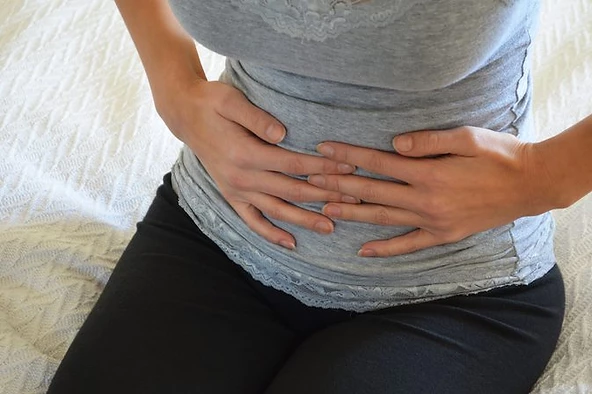Pregnancy nausea (or ‘morning sickness’) is the feeling of nausea or vomiting during pregnancy. Around half to two-thirds of pregnant women will experience nausea or vomiting during their pregnancy, particularly in the first trimester, with symptoms worsening in the morning. But don’t let the name “morning sickness” fool you; it can strike at any time of the day or night!
What causes pregnancy nausea?
There are many causes of pregnancy nausea, including:
- Genetics
- Sensitivity to pregnancy hormones like progesterone which slow down the flow of food and digestive juices through the gut making you feel nauseous
- Reduced blood glucose levels
- Multiple pregnancies like twins or triplets
- Fatigue, and stress.
- Nutrient deficiencies such as vitamin B6 increase nausea during pregnancy.
Research has found two genes associated with hyperemesis gravidarum (HG) or extreme nausea and vomiting in pregnancy which is far more intense, severe and prolonged than ordinary morning sickness. These genes are involved in the development of the placenta and play important roles in early pregnancy and appetite regulation. So there may be a genetic link to hyperemesis gravidarum (HG).
The good news is, unless you’ve got unlucky genes, there are ways to reduce your likelihood of experiencing nausea in pregnancy.
Can pregnancy nausea be prevented?
A few steps can be taken to reduce the likelihood of pregnancy nausea. However, you are growing a little human, and there is a lot going on in your body, so some nausea and fatigue is likely to be inevitable.
It’s important to manage your expectations, your pregnancy may not look like all those movie scenes of a glowing and smiling pregnant person rubbing their bump with glee. Instead, your head might be in a toilet bowl or you nose may be upturned by the faintest whiff of a vegetable.
Focusing on your preconception care and going into pregnancy the healthiest you can be may reduce the likelihood of experiencing pregnancy nausea.
This is because your nutrient stores won’t be as depleted by your little one if you take the time (3-12 months ideally) prior to conception to work with an expert fertility & pregnancy dietitian, like us at The Dietologist, we will make sure that you are well set-up for the realities of pregnancy from before you’re even pregnant, so you can feel a little calmer that baby is getting what it needs despite your distaste for your usual nutritious meals.
And don’t forget your prenatal vitamins. A good prenatal will have a range of important micronutrients to prepare your body for pregnancy and nourish your little one while they’re in the womb.
Given, pregnancy nausea generally is at its peak in trimester one (although it can sometimes persist into trimester two in some cases), you don’t need any extra energy from food, but rather extra vitamins and minerals to support baby’s development.
Key nutrients like folate/folic acid, iodine and omega-3s to name just a few.
If you need guidance with your prenatal supplements before or during pregnancy, please book a 30-minute express supplement consult with one of our practitioners from wherever you are in the world.

What should I do if I’m already experiencing pregnancy nausea?
If you’re already feeling nauseous, here are 5 of our favourite tips for managing pregnancy nausea from our team of certified pregnancy dietitians….
1. A hungry stomach = nauseous stomach
Eating smaller and more frequent meals can help reduce feelings of nausea during pregnancy, as a hungry stomach = a nauseous stomach!
So keep those snacks coming!

2. Always keep a snack close by, including in the bedroom!
Talking about snacks, keeping snacks with you all the time makes it easier to eat frequently and regulate your blood glucose levels. It’s important to keep snacks in your bedroom so you can have a snack before bed to avoid low blood glucose levels overnight.
Having a snack as soon as you wake up in the morning can reduce feelings of nausea in the morning, so keep a couple of crackers or pretzels or some salted nuts beside your bed.

3. Think ginger, B6 and starchy carbs
Ginger has been shown to reduce nausea and vomiting in the first and second trimesters and is safe to have during pregnancy. You might like to try ginger tea, adding ginger to your meals or a ginger supplement, after consulting with your health care provider.
Vitamin B6 supplements are often prescribed to treat pregnancy nausea, but there are many ways to include B6 in your diet. Foods such as salmon, chickpeas and poultry all contain vitamin B6.
Carbs are your best friend! And yes, you will certainly be eating more of these in first trimester, and that’s totally common, normal and okay.
Go for wholegrains when you can, such as rolled oats, Vita-weats (grainy crackers) and Weet-bix (fortified whole-wheat ceral with iron, folate and B vitamins). But don’t feel bad if white carbohydrates are all you can stomach! If you’re up for veggies, aim to have some variety and include a range of sources of folate.
Strawberries, oranges, avocados, and beans are great to include in your diet as they contain folate and other important nutrients.

4. Ice, ice, baby
Icy cold drinks might become your best friend if you’re feeling queasy – sip on ice-cold water or cold ginger tea infusions for a double benefit! Cold foods are sometimes better than hot foods as there is less aroma and, therefore, less nausea. Try a sandwich or salad over a casserole or curry.
Another common hack that our pregnant clients love, is blending up a fresh fruit & veggie juice or smoothie and freeze it into popsicles for a cold and nutritious snack – a great way to sneak in a few extra fruit and veggies into your day too!

5. Do your best when you’re feeling you’re best
You may notice a bit of a pattern in your nausea, you may feel better at certain times of the day, or after a light snack.
Take advantage of those times and maximise your nutrition in those opportunities with whatever lean proteins like eggs, lean red meat, poultry, oily fish that are low in mercury like salmon or sardines, or legumes and beans as well as fruit and vegetables – as these are the foods most commonly pregnant people really struggle with when feeling nauseous!
This may also be an opportune time to take your prenatal and keep it down too!
We will leave you with this, just know, that pregnancy nausea generally passes (with the exception of some cases of HG), and you don’t need to feel guilty about not having the picture-perfect diet when you’re not feeling great.
Do your best, when you can, and if you’re feeling stuck or concerned about your health or your baby’s health or diet – seek individual medical and dietitian support.
If you’d like some more information on pregnancy nausea, listen to our podcast episode with Kaylee Slater APD from The Dietologist team on Fertility Friendly Food.
Or, if you’re needing some individual support, book a consultation with one of our expert fertility & pregnancy dietitians at The Dietologist.
This article was co-written by Court Garfoot, Clinical Nutritionist. You can find Court on Instagram, or on Facebook.







